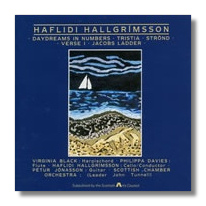
The Internet's Premier Classical Music Source
Related Links
- Latest Reviews
- More Reviews
-
By Composer
-
Collections
DVD & Blu-ray
Books
Concert Reviews
Articles/Interviews
Software
Audio
Search Amazon
Recommended Links
Site News
 CD Review
CD Review
Haflidi Hallgrímsson

- Daydreams in Numbers
- Tristia
- Strönd
- Verse I
- Jacob's Ladder
Haflidi Hallgrímsson, cello
Virginia Black, harpsichord
Philippa Davies, flute
Pétur Jónasson, guitar
Scottish Chamber Orchestra/Haflidi Hallgrímsson
Merlin MRFD 88101
Born in Iceland, Haflidi Hallgrímsson, former principal cello of the Scottish Chamber Orchestra, studied composition with, among others, Alan Bush and Peter Maxwell Davies. The works here certainly go beyond the level of "hobby," but they don't particularly compel you to listen. The sonorities are pleasant enough, particularly the Tristia for guitar and cello, but the program lacks a truly arresting musical idea. The music isn't particularly harsh or "difficult" or even "tonally reactionary," but it all goes down like rice cakes. After several listens, I can't recall one single phrase or gesture.
Daydreams in Numbers consists of a set of études for strings. I know too little of string technique to comment on them as études. As music, however, compared to something like Frank Martin's Four Études for Strings, they blow away like dust. Part of the problem lies in the fact that the études are miniatures, but the musical ideas need room and development. They simply don't grab your attention on their own, as a successful miniature must. The best of them, "Lullaby at Glacier," the composer based on an Icelandic folk song. Even so, the working-out seems stingy.
Hallgrímsson's music doesn't really proceed dramatically. He does unify his pieces through motific development and varies his tempi and textures, but he has almost no rhetorical or narrative sense. Listening to Hallgrímsson's stuff for any length of time is like listening to Ben Stein's drone. The performers do what they can with this Stepford music, and I suppose we should credit them all for not falling asleep.
Copyright © 1997, Steve Schwartz












